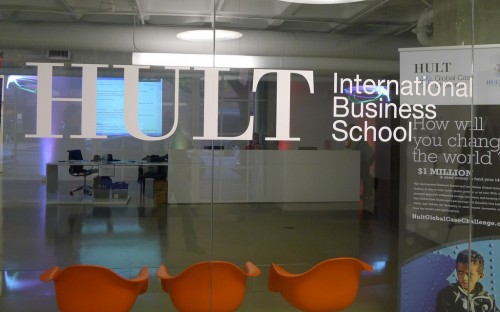The path back into education is paved with good intentions, but the same questions often arise: How will I balance work and study? Do I need this degree to get to where I want to? Is it worth the investment?
GMAC’s 2018 alumni employment report goes a long way to allaying those fears. 89% of Executive MBA students it surveyed said the skills they learned at business school advanced their career, and 83% asserted that graduate management education pushed them up the career ladder.
At Hult International Business School—the only triple-accredited US business school—the benefits of executive education are backed up by hard facts. According to the Economist, in 2015 72% of Executive MBA students at Hult were promoted or launched their own company after completing the degree. On top of that, 95% of Hult alumni would recruit graduates from the school's EMBA program.
BusinessBecause caught up with three Hult EMBA grads, who reveal their reasons for choosing the school, how it’s benefited their career, and offer some golden words of advice for any EMBA applicant considering the program.
Nigel Hattersley, EMBA ’18
Nigel worked in hospitality, as a regional director for IT in the Middle East before he landed on the Hult EMBA program. He had worked for Starwood Hotels and Resorts for more than 20 years when it was put up for sale.
“I wanted to ensure I was correctly prepared for any change that might occur,” he says. “I needed to prove to myself that I was someone with the right level of strategic management and business acumen, which would allow me to be identified as someone who can set the right path forward for a business.”
Now working as a senior director of IT in the Middle East and Africa for Marriot International, Nigel explains that the setup of the Hult EMBA allowed him to transfer his knowledge directly back into his work, keeping him career fresh and motivated.
He adds that he saw a “definite improvement” in the way he is now able to communicate with stakeholders and project managers, gaining an understanding of the business cycle and requirements.
“I’m looking forward to the opportunities the EMBA will bring me,” he says, “in finding a more strategic and higher leadership position.”
“It’s a lot of hard work,” he admits, “but when you have a clear goal in mind of where want to be and what want to do, failing is not an option.”
Jussara Nunes, EMBA ’18
“I found Hult International Business School just at the right time,” says Jussara, who is among the one-third of women who make up the Hult EMBA cohort. She has spent her career progressing up the BNP Paribas ladder and now works as a customer journeys expert for the firm.
“I wanted to acquire more business capabilities in operations and finance management, and develop my leadership as well,” she adds.
“Going through the different modules you see that in fact you know a lot, but at the same time you don’t. It’s a weird sensation.”
Jussara’s industry, like all industries, is in the midst of the fourth industrial revolution—Industry 4.0. “We must stay up to date to know what’s going on, to be able to foresee opportunities and embrace new challenges,” Jussara explains. “I think it is important to keep our intellectual vision fresh.”
Jussara admits that going back to study at business school was out of her comfort zone, but embracing that challenge is paying dividends in her work with BNP Paribas. The Leading for Innovation module, in fact, formed the basis for one of her work-based projects.
“It is really satisfying to see all these topics and concepts, then go back to our offices and actually use them,” she says. “You’ll be glad you joined this crazy journey.”
Matteo Magagnoli, EMBA '15
BCG consultant Matteo was the youngest member of his EMBA cohort when he arrived at Hult. “I wanted to go and get exposure to a lot of industries,” he says. “That’s what you get with the EMBA, more senior people who have something to say from their years of experience.”
That helped keep him fresh and motivated while he worked for APC Asia Pacific Cargo—he embarked on the EMBA program as he was actively seeking opportunities away from his erstwhile role.
He explains that on the Hult EMBA “you get to see a lot of different things you don’t see unless you’re extremely senior.” For anyone apprehensive about relaunching their life as a student, Matteo asserts that without the education from Hult International Business School he would have remained blocked in a silo.
“When you go back to work you see how all the theory translates to what you do, so you try new things, and you question things you wouldn’t before—it’s a path to your next job.”
The Hult EMBA freshened up Matteo’s network too. “Consulting is all about getting your name out there,” he says. Indeed, another of Matteo’s classmates followed a similar path, ending up at McKinsey after graduating.
His advice? Be ready to learn.
“We saw a lot of experienced people thinking that they knew how things worked,” he explains. “But, you start teamwork and people start challenging you. What you think you know is not necessarily the right way to approach things.
“If people go in with that attitude, I think they will benefit a lot. It really keeps you on your toes.”











